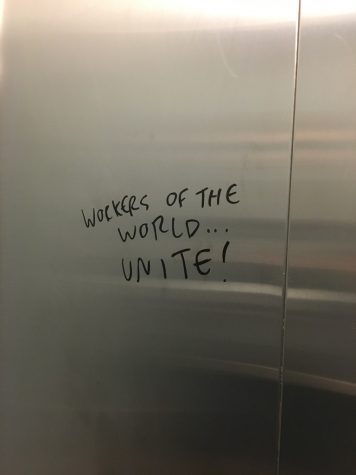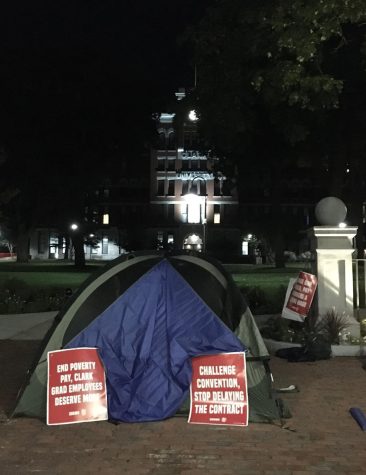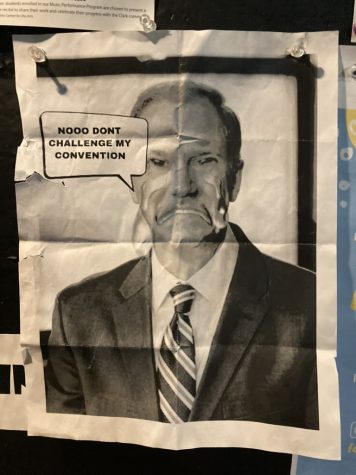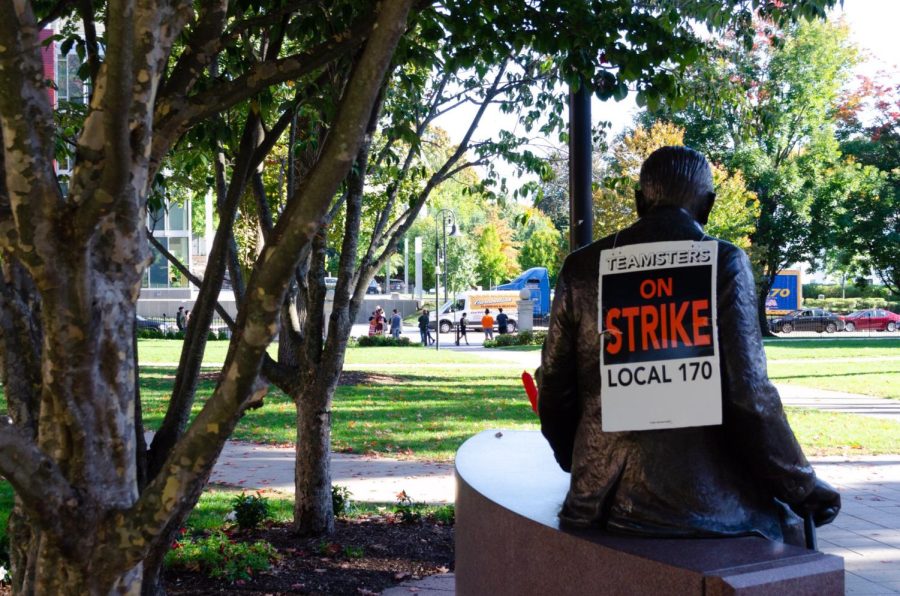Union Myth Busting
October 14, 2022
Our schools and popular culture do a poor job of teaching us about what unions are and how they work. Opponents of unions can exploit the gaps in our collective knowledge to build a narrative in which unions are the villains, escalating conflicts and restricting freedom. During the 5-day graduate workers’ strike here at Clark, I spent time on the picket line talking to Teamsters officials and graduate workers, gathering information to help correct the record.
On Monday, Oct. 3, at 10:30 a.m., members of Clark University Graduate Workers Union (CUGWU) left their jobs on campus and gathered outside of the front gate by Main Street. They refused to return to work until the Clark administration met their demands for a contract that would provide a living wage, healthcare for dependents, dignified benefits and working conditions, and protections for the long-term success of the union.
Many undergraduate students and some faculty carried signs and chanted on the picket line. Separate picket lines formed at the entrances to the Media Arts, Computing, and Design (MACD) construction site on Woodland Street, the parking garage entrance at the corner of Downing and Florence Street, and the loading dock on Maywood Street. These locations are all entrances to campus where picketers could ask construction and delivery workers to stop working, thereby putting economic pressure on the university.
The union’s bargaining committee met with Clark administrators on Oct. 5, but negotiations ended without an agreement. On Oct. 7, they met again and reached a tentative agreement. The strike officially ended at 5:00 p.m. on Friday. On Oct. 12, the members of the bargaining unit unanimously ratified their first official contract. I recommend reading more about the strike here.

Myth: Workers can and should negotiate without a union. Unions are unnecessarily adversarial.
The graduate workers at Clark tried that, and it did not work. According to a member of the bargaining committee, students had been contacting Yuko Aoyama, the dean of graduate studies, since 2014 with concerns about unaffordable healthcare. Nothing changed until last year, when the graduate workers petitioned for more affordable healthcare in a precursor to their unionization effort. The only way that graduate workers, and all workers, can overcome the inherent power imbalance between themselves and their employers is by leveraging their collective power and threatening to withhold their labor.
It disheartens me to see alumni attacking the union’s decision to strike, as if that is more adversarial and disrespectful than the university exploiting some of their most valuable workers. I see Clark’s $4 million administration travel budget and attempts to defund the FIRM pantry as far more adversarial and disrespectful than the decision to go on strike. There is no place for the deeply flawed idea that oppressed people need to ask politely for their freedom at our university.
Myth: It’s reasonable for negotiations to take a long time. The union should have been more patient and waited longer before declaring a strike.
The union’s bargaining committee met with the administration to negotiate a first contract six times in the spring and summer of 2022. The Clark administration has emphasized to families that on average, first-contract negotiations take over a year. That fact doesn’t justify the delay. It’s a reason to push for a negotiation even faster, to decrease that average to be more appropriately urgent.
A member of the bargaining committee pointed out to me that by treating graduate workers poorly, Clark is hemorrhaging talent. “My colleagues have left the program because they couldn’t find housing,” they recalled. “A lot of my colleagues who are international students in particular got here, couldn’t find an apartment, and were teaching classes while functionally homeless for weeks.”
Under those conditions, there is absolutely no justification for delaying the contract. It is a matter of survival for the graduate workers, and for the university. Graduate students are absolutely essential to the real work that our university does, the research that Clark stakes its reputation on.
Myth: The initial offer that Clark administration made on Oct. 5 was generous and the union bargaining committee should have accepted it.
On Oct. 5, the third day of the strike, the Clark administration proposed a contract with a much higher stipend for most departments. The union bargaining committee rejected it because it did not provide healthcare for dependents and did not limit the fees that the university could demand later on.
On Oct. 6, I picketed on Woodland street alongside Ghillis Ainouche, an international 4th year physics student on the bargaining committee. He reported that after the union rejected the initial offer, the administration left the room, saying that they were going to talk to financial management. The union representatives waited for over two hours, expecting the administration to return, only to learn that the administration had left the building and emailed parents, students, and faculty to say that the union had rejected a reasonable offer. Ainouche called the administration’s actions “outrageous.” In his eyes, “the motive is to turn everyone against the bargaining committee and force us to accept the offer.”
That night, I sat in a folding chair at the front gate with Maddie Logan, a 3rd year in the clinical psychology doctoral program. She reaffirmed the bargaining committee’s decision to reject the offer, saying, “even if the contract would be sufficient for me but it’s not for other people, such as masters students, or the one program that wasn’t even getting a raise, then that’s unacceptable. We are a collective and a community and it has to benefit everyone… The number looks flashy and nice and it’s progress, but I think they made the right call to not jump on that first offer.”
Myth: Picketers illegally blocked construction sites.
Tuesday through Friday mornings, dozens of supporters joined the picket lines at the entrances to the MACD construction site at 5:15 a.m. Picketers had to follow many rules: they had to keep moving to avoid charges that they were blocking the entrances, and if a police officer ordered them to let a vehicle or person through the line, they had to comply.
Picketers never physically prevented construction workers from doing their work, they simply asked the workers to join them in solidarity. The construction workers, who are also unionized, walked off of the job and joined the picket line at 7 a.m. on Tuesday morning. One held up his water bottle to proudly show us his union sticker, and another boasted that he had been in the union for over 40 years. Solidarity, not illegal or aggressive picketers, halted construction.
On Oct 6, I picketed at a construction site with doctoral student Nora McCormick, who told me that the administration was “trying to characterize strikers as disrespectful, belligerent, rude, abusive, intimidating, racist, and it’s simply not true… There’s a real classist component to this. I think that the Teamsters are being viewed as these blue-collar, gruff, older white men and they’re hoping that people will believe that those are the type of people who would say those things or act that way… it’s incredibly shitty and manipulative.”
Myth: Union leadership makes decisions without the input of the members of the bargaining unit.
CUGWU, and the larger Teamsters organization, are representative democracies. The union membership elected the bargaining committee and many officials higher up within the union. The bargaining committee has the ability to negotiate directly with the university, and then all members vote on whether or not to ratify the contract. The union is significantly more democratic than, for example, Clark University.

Myth: Teamsters officials are aggressive and do not belong on our campus.
The official CUGWU Instagram page put out a statement on Friday to refute this idea. “The Teamsters Local 170 is our family,” the message reads. “They have shown up for us more just this week than Management has in years.” Teamsters officials were the ones who reminded picketers that we had to follow instructions from police, and who talked directly with the MACD building construction workers to gain their alliance.
Teamsters officials on campus provided food, hot drinks, tents, sleeping bags, and folding chairs. When I spent the night on the picket line at the front gate, Teamsters officials checked in on me and my friends to ensure that we felt safe. In the morning, they insisted that we have fresh donuts before breaking down the tent.
I would go so far as to argue that Teamsters officials provided the safety and community care that our University Police fail to. Without weapons, the Teamsters protected students from a delivery truck’s aggressive driving. Because they are elected and have genuine accountability to the union and the Clark community, I felt far safer being on Main Street at 3:00 a.m. with them than I would with armed police.
Myth: The presence of a powerful union will discourage graduate students from coming to Clark.
Union activity will attract more students who believe in challenging convention and changing the world. For PhD student MK Speth of the Holocaust and Genocide Studies department, being unionized is part of the appeal of Clark’s graduate program. “I knew entering [Clark] that I wanted to be involved in the union,” she said. By addressing homelessness and food insecurity, the university and union will be able to attract and retain the very best students and workers.
Myth: People go on strike because they don’t want to work.
Teamsters official Ken Bergen, who has been involved in nine successful Teamsters strikes in the last seven years, said that “being involved in a strike is difficult for everyone. There’s the uncertainty…There’s a lot of time involved, and a lot of stress. When you are conducting a strike there’s sacrifice.”
Logan emphasized the emotional toll that going on strike took, saying, “I didn’t want to not see my students anymore, and it was really heartbreaking to have to stop teaching. I feel like we’ve been backed into a corner to have to do that to live and gain any sort of respect from the university and the administration.”
Multiple graduate workers talked to me about how hard it was to spend hours on the picket line, and then also try to keep up with their classwork. I conducted one interview on the picket line with a graduate worker who was simultaneously attending a virtual lecture.
It’s also important to note that graduate workers who went on strike lost five days of pay. Strikes are very financially risky, especially for our graduate workers who have dependents or are international students and therefore cannot work any other jobs. The idea that being on strike is like being on a vacation, or an excuse to shirk responsibilities, is deeply out of touch with the harsh reality of being on strike.

Myth: The strike was fueled by anger and aggression.
“Yes, there is anger,” Logan freely admitted. “That anger comes from a place of hurt and pain and feeling disrespected and unappreciated at a basic human level and that anger is justified. And we’ve come together in a really beautiful way… we do have a lot to celebrate.”
Just like on the Starbucks picket line which I covered earlier this fall, the strike ran on community support and celebration. Members of the International Socialist Group (ISG) contributed pots and pans for joyful noise-making. Undergraduates made up silly chants and printed out memes about President Fithian owning too many horses. Members of Jews Givin’ A Fuck (JGAF) brought a speaker and a labor-inspired playlist.
When it rained, Teamsters officials provided umbrellas. On a hot afternoon, students pulled up chairs and sat in the shade. Picketers played frisbee at the loading dock. Often, there were more people excited to give away food than there were people who needed to eat the food, and picketers donated it to the FIRM pantry. A first-year undergraduate excitedly gave me a tour of all of the chalk messages and drawings left by supporters at the front gate.
A dog named Winston and a cat named Sesame also joined the picket line. Sesame’s owner, Vanchy Li, is a graduate worker in the geography department. She told me that being on the line gave her “a sense of achievement and excitement.” She proudly stated that Sesame had become “like a pop star…He’s a good cat.”
Logan began to tear up when I asked her what the best part of the CUGWU strike was. “It feels like this is the first time that I’ve been valued for my work, and it’s coming from the undergrads and not from the administration,” she said. “All of our fears about being alone in this have been vanquished. It feels like a warm hug from Clark.”

